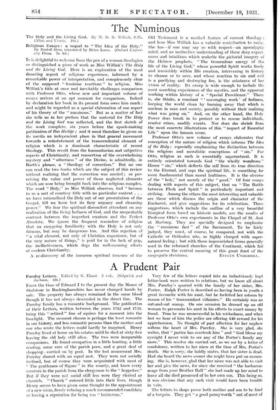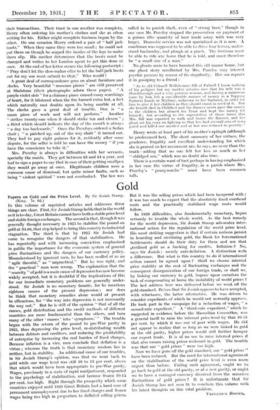A Prud ent Pair
Fitom the time of Edward I to the present day the Manor of Shalstone in Buckinghamshire has never changed hands by sale. The property has always remained in the same blood though it has not always descended in the direct line. The Purefoy family has -a romantic background. The publication of their Letters, written between the years 1735 and 1753, bring this " retired " line of squires for a moment into the limelight. The moment chosen is perhaps the least romantic in our history, and less romantic persons than the Mother and ion who wrote the letters could hardly be imagined. Henry l'urefoy lived at home on his estates until he died at sixty-five leaving the old lady still alive. The two were inseparable companions. He found occupation in a little hunting, a little reading, some care of the parish poor, and a great deal of shopping—carried on by post. In the last amusement Mrs. Purefoy shared with an equal zest. They were not socially inclined, but of course they were acquainted with most of
The gentlemen of ffigure " in the county, and knew every creature in the parish from the clergyman to the " hogpoker." But if they were not social still less were they clerical or clannish, " Church " entered little into their lives, though Henry seems to have given some thought to the appointment ofa new vicar, firmly refusing a much recommended candidate as having a reputation for being too "boisterous."
Very few of the letters copied into an industriously kept letter-book were written to relations, but we know all about Mrs. Purefoy's quarrel with the family of her sister, Mrs. Porter. Ralph Porter is described as having been in youth a great favourite with his aunt, but he forfeited her esteem by reason of his "transcendent villainies." He certainly was an out-and-out scamp. On one occasion he dressed up an old woman to personate his aunt in his efforts to exact money by fraud. True he was unsuccessful in his wickedness, and when last we hear of him the police are offering 140 reward for his apprehension. No thought of past affection for her nephew softens the heart of Mrs. Purefoy. She is very glad, she writes, that "justice has overtook him" and "God blesse my eyesight I never wish to see any of the Porter's family any more." This resolve she carried out, as we see by a letter of condolence, written to her niece at the time of Mrs. Porter's death. She is sorry, she baldly states, that her sister is dead. Had she heard the news sooner she might have put on mourn- ing. She is, however, glad that her niece was not able to visit her and give the news, for since she received "the barbarous usage from your Brother Ralf" she had made up her mind to leave all she died possessed of to her own son. This being so, it was obvious that any such visit would have been trouble in vain.
The letters to shops prove both mother and son to be fond of a bargain. They got "a good pennyworth" out of most of
their transactions. Their trust in one another was complete, Henry often ordering his mother's clothes and she as often writing for his. Either might complete business begun by the other. On one occasion Henry ordered a pair of "half jack boots." When they came they were too small ; he could not put them on though he soaped the insides of the legs to make them slip. His mother determines that the boots must be changed and writes to her London agent to get this done at once. At the end of her letter occurs the following postscript : "Pray don.'t let the shoe-maker offer to let the half-jack boots out for my son wont submit to that." Who would !
A great deal of correspondence goes on about furniture and -.locks. Very beautiful " museum. pieces" are still preserved at Shalstone (their photographs adorn these pages). A purple violet slob " for a chimney piece caused many searchings of heart, for it blistered when the fire burned extra hot, a fact which naturally east doubts upon its being marble at all. The clocks gave a great deal of trouble. One is "a mean piece of work and will not perform." Another "strikes twenty-one when it should strike ten and eleven " ; a third which should indicate the day of the month is always "a day too backwards." Once the Purefoys ordered a Sedan chair ; a patched up, out of the way chair" it turned out. They had to pay eight guineas for it, evidently after some dispute, for the seller is told he can have the money if you have the conscience to take it."
Mrs. Purefoy is always in difficulties with her servants, specially the maids. They got between 13 and PA a year, and had to sign a paper to say that in case of their getting smallpox they would go away at once. Illegitimate children were a common cause of dismissal, but quite minor faults, such as being "violent spirited" were not overlooked. The law was called in to punish theft, even of "strong beer," though in one case Mr. Purefoy stopped the prosecution on payment of a guinea (the quantity of beer made away with was very large). Domestic service was not specialized as it is now. A coachman was supposed to be able to drive four horses, under- stand husbandry, and plough at a pinch. The footman must be able to ride any horse that he is told, and must therefore be "a small size of a man."
No ghosts seem to have haunted this old manor house, but one ghost story recollected by Mrs. Purefoy may interest psychic persons by reason of its singularity. Her son repeats it in gossiping to a friend :
" As to old Colonel Wellsbourne Sill of Fulwell I know nothing of his pedigree but my mother informs ince that his wife was a Shuekborough and a very prudent woman, and having a numerous issue by him left a considerable summa of money in a Topping ffarmers hands at Mixbury, unknown to her husband, in order for him to give it her children as they should stand in need, of it. But she herself died in Childbed and the ffarmer never gave the money to the children but abused his Trust and kept the money for himself ; but according to the superstition of those times this Mrs. Sill was reported to walk and haunt the ffarmer, and her ghost set his cows on fighting so that. hee had several sets of cows gored and killed one another and at last was reduced to poverty."
Henry wrote at least part of his inother's epitaph (although he predeceased her). The short summary of her virtues, the prudence, frugality and excellent understanding for which she is praised on her monument are, he says, no inure than the truth—adding that no one felt her loss so much as her " oblidged son," which was no doubt also true.
There is a certain want of tact perhaps in having emphasized in her case the virtue of frugality, in a parish where Mrs. Purefoy's "pennyworths" must have been common talk.



































 Previous page
Previous page